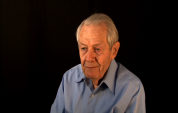6:04 | After the war became a stalemate with a static front, Bob Moore's unit moved across most of the major hilltop battlefields including Old Baldy and the Punchbowl. They were surprisingly close together as he moved eastward.

From Long Island, Bob Moore was "invited" by the government to join the Army. He remembers the cold weather training in Pennsylvania and the words of the tough sergeant, words he would often appreciate later in Korea.
If you need to pick off a target at 1500 yards, the heavy M-1 is perfect, says Bob Moore. But if you need to crawl around in the dark on patrol, the carbine is a much better weapon. Especially after the maintenance guys modified it.
As he prepared to leave for Korea, Bob Moore found out his wife was expecting a child. This was a sobering thought as he headed for a replacement center near the front. There he heard an unusual motivational speech that stuck with him.
As soon as Bob Moore arrived as a replacement at the front lines, he had to climb a treacherous hill where he proceeded to get chewed out by LT Joe Davis for not being a machine gunner. Thanks to a great sergeant, Dan Sharp, he soon was.
Bob Moore's first night on Old Baldy was memorable. The lines had become static, but there were still attacks, and he was tested that night in his new position on a machine gun squad when the Chinese launched a massive attack against the Americans on Old Baldy. The greater test was after the combat when he dealt with the wounded for the first time.
After a wild first night at the front, everyone else was headed back up the hill to the bunkers but Bob Moore remained behind with his platoon sergeant on the flank of Old Baldy. He was about to find out what a listening post was and how a still night can play tricks on your senses.
On guard duty one night, Bob Moore heard the Chinese loudspeakers broadcasting a propaganda appeal. It did get to him a little when they said his supporting units had left them alone. Bugles and drums were another psychological weapon and the Americans countered with huge spotlights to light up the advancing enemy.
A portion of the line manned by Republic of Korea (ROK) troops was overrun. Bob Moore's unit was sent to plug the hole, and as they struggled, help came in the form of a Forward Observer from the battleship USS Missouri. The "Mighty Mo" was anchored within range of the hill and it's barrage turned the tide of the battle, but the noise of the shells and gunfire had a lasting effect on Moore.
Bob Moore recalls chaplain Cormac Walsh, who was highly decorated while there with him at the Korean front. The chaplain had multiple Silver Stars for valor, but it wasn't bravery, it was his connections, that Walsh used to help Moore visit a friend in a nearby unit. Along the way was the Mad Mile, an exposed area where the artillery was zeroed in.
His last post was Sandbag Castle, another barren Korean hill, where the soldiers had hoisted an American flag and then got rid of it as the artillery zeroed in. A new commander surveyed the situation and decided what he needed was modified depth charges that could be catapulted at the enemy.
Bob Moore's closest call was when a Chinese mortar shell hit his bunker entrance. He was blown off his feet by the concussion but was lucky enough to get no shrapnel from the blast. Soon he had given in to the chaplain's demand that he get baptized.
Bob Moore hated to leave his buddies but when he had the points, he immediately headed down the hill. After a memorable entrance into the New York harbor, he got to see his new baby for the first time.